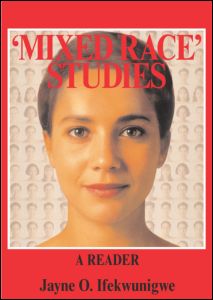Black, Jewish, and Interracial: It’s Not the Color of Your Skin, but the Race of Your Kin, and Other Myths of IdentityPosted in Books, Family/Parenting, Identity Development/Psychology, Judaism, Media Archive, Monographs, Religion, United States on 2009-09-25 03:50Z by Steven |
Duke University Press
1997
232 pages
Cloth – ISBN13 978-0-8223-1975-7
Paperback – ISBN13 978-0-8223-1971-9
Katya Gibel Azoulay [Mevorach], Professor
Anthropology and American Studies
Grinnell College, Grinnell Iowa
How do adult children of interracial parents—where one parent is Jewish and one is Black—think about personal identity? This question is at the heart of Katya Gibel Azoulay’s Black, Jewish, and Interracial. Motivated by her own experience as the child of a Jewish mother and Jamaican father, Gibel Azoulay blends historical, theoretical, and personal perspectives to explore the possibilities and meanings that arise when Black and Jewish identities merge. As she asks what it means to be Black, Jewish, and interracial, Gibel Azoulay challenges deeply ingrained assumptions about identity and moves toward a consideration of complementary racial identities.
Beginning with an examination of the concept of identity as it figures in philosophical and political thought, Gibel Azoulay moves on to consider and compare the politics and traditions of the Black and Jewish experience in America. Her inquiry draws together such diverse subjects as Plessy v. Ferguson, the Leo Frank case, “passing,” intermarriage, civil rights, and anti-Semitism. The paradoxical presence of being both Black and Jewish, she argues, leads questions of identity, identity politics, and diversity in a new direction as it challenges distinct notions of whiteness and blackness. Rising above familiar notions of identity crisis and cultural confrontation, she offers new insights into the discourse of race and multiculturalism as she suggests that identity can be a more encompassing concept than is usually thought. Gibel Azoulay adds her own personal history and interviews with eight other Black and Jewish individuals to reveal various ways in which interracial identities are being lived, experienced, and understood in contemporary America.


